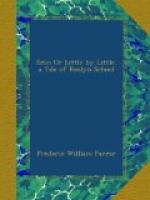He could sleep no longer. Whenever he closed his eyes he saw the pale, dead, holy features of Edwin, and at last he fancied that he was praying beside his corpse, praying to be more like him, who lay there so white and calm; sorrowing beside it, sorrowing that he had so often rejected his kind warnings, and pained his affectionate heart. So Eric began again to make good resolutions about all his future life. Ah! how often he had done so before, and how often they had failed. He had not yet learned the lesson which David learned by sad experience; “Then I said, it is mine own infirmity, but I will remember the years of the right hand of the Most High.”
That, too, was an eventful night for Montagu. He had grown of late far more thoughtful than before; under Edwin’s influence he had been laying aside, one by one, the careless sins of school life, and his tone was nobler and manlier than it had ever been. Montagu had never known or heard much about godliness; his father, a gentleman, a scholar, and a man of the world, had trained him in the principles of refinement and good taste, and given him a high standard of conventional honor; but he passed through life lightly, and had taught his son to do the same. Possessed of an ample fortune, which Montagu was to inherit, he troubled himself with none of the deep mysteries of life, and
“Pampered the
coward heart
With feelings all too
delicate for use;
Nursing in some delicious
solitude
His dainty love and
slothful sympathies.”
But Montagu in Edwin’s sick-room and by his death bed; in the terrible storm at the Stack, and by contact with Dr. Rowlands’ earnestness, and Mr. Rose’s deep, unaffected, sorrow-mingled piety; by witnessing Eric’s failures and recoveries; and by beginning to take in his course the same heartfelt interest which Edwin taught him—Montagu, in consequence of these things, had begun to see another side of life, which awoke all his dormant affections and profoundest reasonings. It seemed as though, for the first time, he began to catch some of
“The still gad music of humanity,”
and to listen with deep eagerness to the strain. Hitherto, to be well dressed, handsome, agreeable, rich, and popular, had been to him a realised ideal of life; but now he awoke to higher and worthier aims; and once, when Russell, whose intelligent interest in his work exceeded that of any other boy, had pointed out to him that solemn question of Euripides—




